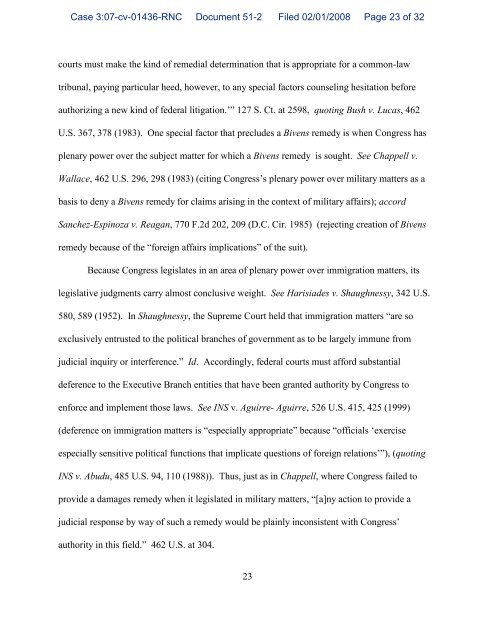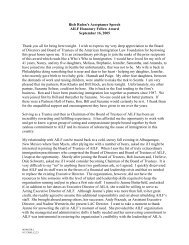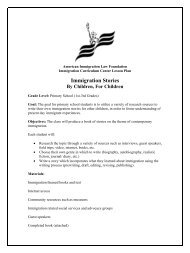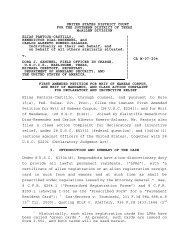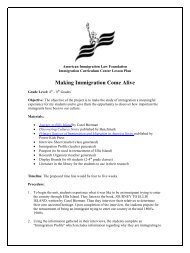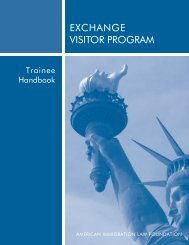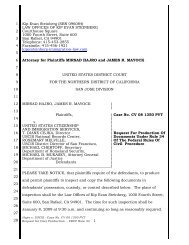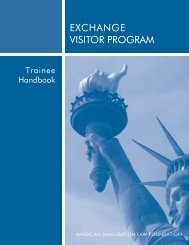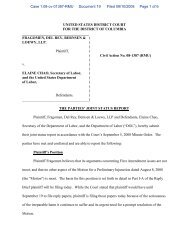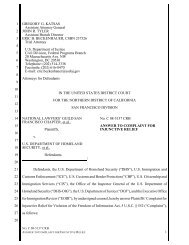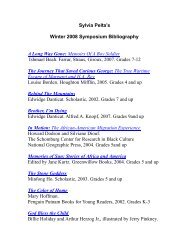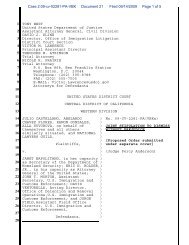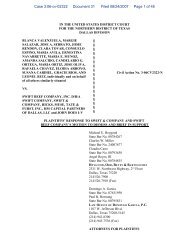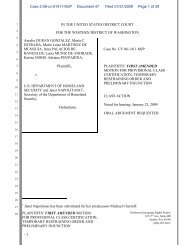Defendants' Motion to Dismiss for Lack of Subject Matter Jurisdiction
Defendants' Motion to Dismiss for Lack of Subject Matter Jurisdiction
Defendants' Motion to Dismiss for Lack of Subject Matter Jurisdiction
- No tags were found...
Create successful ePaper yourself
Turn your PDF publications into a flip-book with our unique Google optimized e-Paper software.
Case 3:07-cv-01436-RNC Document 51-2 Filed 02/01/2008 Page 23 <strong>of</strong> 32courts must make the kind <strong>of</strong> remedial determination that is appropriate <strong>for</strong> a common-lawtribunal, paying particular heed, however, <strong>to</strong> any special fac<strong>to</strong>rs counseling hesitation be<strong>for</strong>eauthorizing a new kind <strong>of</strong> federal litigation.’” 127 S. Ct. at 2598, quoting Bush v. Lucas, 462U.S. 367, 378 (1983). One special fac<strong>to</strong>r that precludes a Bivens remedy is when Congress hasplenary power over the subject matter <strong>for</strong> which a Bivens remedy is sought. See Chappell v.Wallace, 462 U.S. 296, 298 (1983) (citing Congress’s plenary power over military matters as abasis <strong>to</strong> deny a Bivens remedy <strong>for</strong> claims arising in the context <strong>of</strong> military affairs); accordSanchez-Espinoza v. Reagan, 770 F.2d 202, 209 (D.C. Cir. 1985) (rejecting creation <strong>of</strong> Bivensremedy because <strong>of</strong> the “<strong>for</strong>eign affairs implications” <strong>of</strong> the suit).Because Congress legislates in an area <strong>of</strong> plenary power over immigration matters, itslegislative judgments carry almost conclusive weight. See Harisiades v. Shaughnessy, 342 U.S.580, 589 (1952). In Shaughnessy, the Supreme Court held that immigration matters “are soexclusively entrusted <strong>to</strong> the political branches <strong>of</strong> government as <strong>to</strong> be largely immune fromjudicial inquiry or interference.” Id. Accordingly, federal courts must af<strong>for</strong>d substantialdeference <strong>to</strong> the Executive Branch entities that have been granted authority by Congress <strong>to</strong>en<strong>for</strong>ce and implement those laws. See INS v. Aguirre- Aguirre, 526 U.S. 415, 425 (1999)(deference on immigration matters is “especially appropriate” because “<strong>of</strong>ficials ‘exerciseespecially sensitive political functions that implicate questions <strong>of</strong> <strong>for</strong>eign relations’”), (quotingINS v. Abudu, 485 U.S. 94, 110 (1988)). Thus, just as in Chappell, where Congress failed <strong>to</strong>provide a damages remedy when it legislated in military matters, “[a]ny action <strong>to</strong> provide ajudicial response by way <strong>of</strong> such a remedy would be plainly inconsistent with Congress’authority in this field.” 462 U.S. at 304.23


